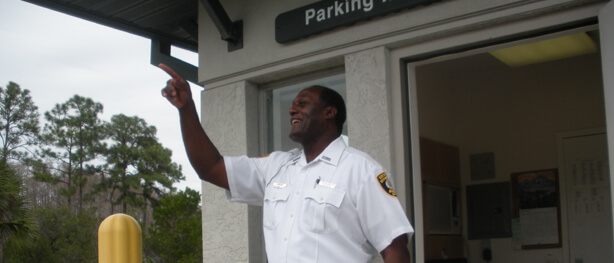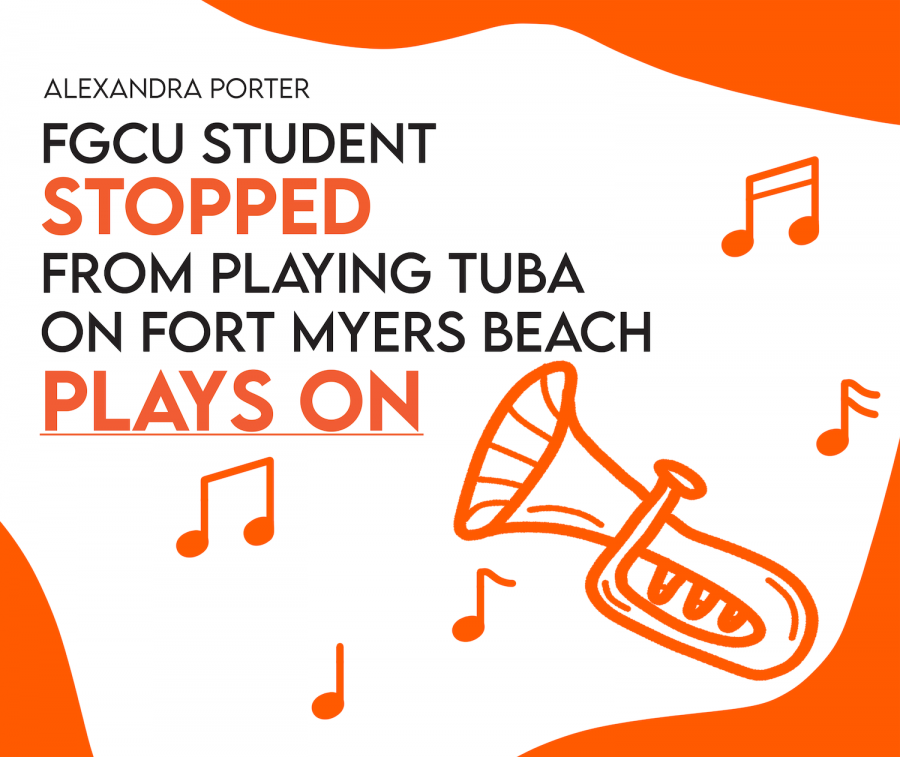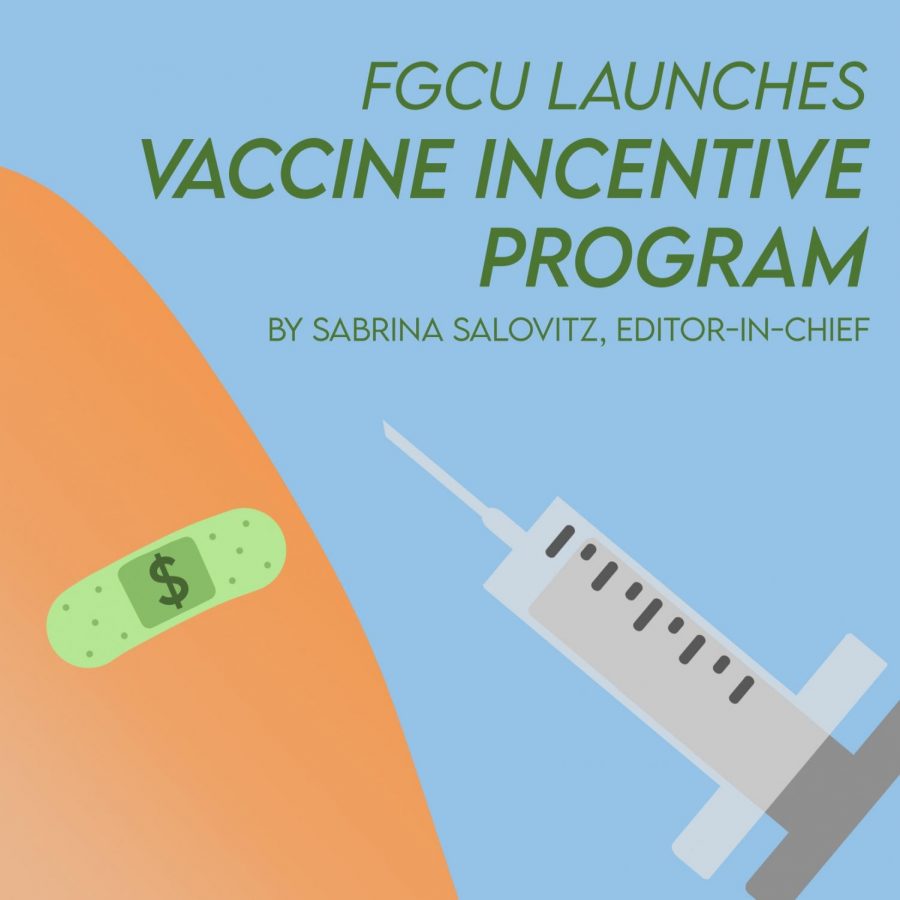Members of the Florida Gulf Coast University community who have driven past the information booth and wondered whose car is parked beside it should know it is there under protest. Robert Green, an FGCU employee who works in the information booth and owns that Buick LeSabre, will not pay for a permit to park in a campus parking lot.
“If you’re trying to charge me to park where I work — that’s ridiculous,” Green said.
Green has been working at FGCU and representing staff on the Staff Advisory Council for nine years, and he says that staff members have approached him to work on getting free parking for FGCU employees for seven of those nine years.
Annual parking permits for faculty and staff cost $118, and a discount is available if the permitted vehicle is a certified low-emissions vehicle. Reserved spots cost $535 annually.
According to Steven Moore, chief of the University Police Department, the reserved spots cost more than the general permits to offset the cost of having just one person use that spot, instead of allowing other people to park in the spot as it becomes available.
Moore does not think free parking for faculty and staff is a realistic goal.
“Every university charges for this,” Moore said. “We’re not charging just to make money. We can’t use tax money from the state for parking services.”
According to data from 2012, which included the 10 other state universities that existed at that time, FGCU had the third-lowest cost for general faculty parking fees and the fifth-lowest for the cost of a reserved space. University of Central Florida and University of South Florida charge the most for general parking fees, both between $250 and $350. USF and UCF also charge the most for reserved spaces, both charging more than $1,000. At that time, New College did not offer reserved parking spaces.
Green does not think universities should charge anybody for parking because “the land is already paid for. They’re (the university) making enough money from students for their budget.”
In a letter to President Bradshaw that was discussed at an October 2013 Staff Advisory Council meeting, Green expressed his concern that charging faculty, staff and even students for parking is bad for the community.
“[Charging for parking] conflicts with the spirit and intent of our institutional statement of being a ‘welcoming’ educational community,” Green wrote. Green says that no progress has been made toward free parking since the meeting.
The letter provides that as of July 15, 2013, students paid $2.75 per credit hour for parking and $5.95 per credit hour for transportation, regardless of whether they had a car on campus or used campus transportation.
According to Moore, from July 2013 to June 2014, parking permits were issued for 7,092 commuter students and 3,127 students living in student housing. That means that of approximately 14,500 students, 4,281 paid for parking services that they were not using.
In the same period, 1,444 permits were issued for faculty, staff, adjunct and other personnel services members combined.
For the fiscal year 2013-14, $3,244,944 was collected in relation to parking operations. This revenue includes student transportation fees, parking permits, parking fines and events parking.
Moore estimates that two to three events are held each week that require that a parking lot be blocked off, in which case an attendant is paid $15 per hour to keep the lot empty until the event begins. In some cases, groups will pay $1 per car for a parking spots on campus.
In the same period, $3,222,557 was incurred in expenses for parking operations. This money went to pay Parking Services employee salaries and benefits, utilities, operating expenses (which includes the cost of running shuttles), and the construction, debt payment and overhead for parking garages.
According to Moore, the $22,387 in revenue that was leftover “rolls over.”
“That goes toward building funds to build a parking lot in the future,” Moore said.
Green says that because parking permits only cost 66 cents, it should not cost any more than that for faculty and staff to park on campus.
“Education is not a business. It’s a service. Free parking should be for everyone: faculty, staff and students because we already own the land.”
Moore says that while 66 cents is the cost of a physical permit, “that’s not the cost of operating a parking system.”
“What’s happened over the eight years I’ve been here is we’ve tied student per credit hour rate increases to faculty and staff increases,” Moore said. “If student rates increase, so do faculty and staff rates.”
He says that if parking becomes free for faculty and staff, the money to pay for parking operations would still have to come from somewhere.
“If students want free parking for faculty, we could increase student fees to cover it,” Moore said.









































David Dees • Jul 31, 2015 at 10:30 pm
Er…..money-grab
David Dees • Jul 31, 2015 at 10:30 pm
Charging Staff and employees to park where they work is an absurd power-grab
Joseph Cofield • Apr 30, 2015 at 7:25 am
The SAC Councilman makes a great point, “Education is not a business. It’s a service.” It appears to me from the comment of the Chief of the University Police Department, “the money to pay for parking operations would still have to come from somewhere” is a very poor reason for shortchanging a young student who truly believes that the key to success is by way of an educate. Perhaps the first step in giving the students something back from their hard earned money is offering the free parking they deserve. Reserving money for future parking on the backs of the present students makes no sense to me because if we ever going to need more parking this means increase in enrollment. Therefore, those additional students will pay their way just as the students are now. The community will step up and university officials will figure a way just as they did in 1999 when they saw FGCU as a place for education and not a business opportunity. Our university system (and educational system in general) should be about educating our students for a brighter future and keeping our nation strong and not about how we can make business decisions at the expense of the current students. Those students are the ones we are training to fix the simple problems such as who will find a way to pay for the parking space on the larger campus if ever needed.
Jennifer Noriega • Apr 29, 2015 at 7:06 pm
..so then it’s not really free parking if you’re going to raise student fees then we are still technically paying it lol